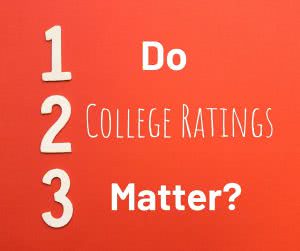 Most high school students will take a look at college ratings when working on their shortlist of colleges to apply to. Admittedly, finding your preferred colleges features high on the college ratings list can be quite a relief. It feels like some sort of endorsement – if a college is highly rated it must be good, isn’t it? Well… maybe, maybe not.
Most high school students will take a look at college ratings when working on their shortlist of colleges to apply to. Admittedly, finding your preferred colleges features high on the college ratings list can be quite a relief. It feels like some sort of endorsement – if a college is highly rated it must be good, isn’t it? Well… maybe, maybe not.
How much do college ratings actually matter? Should you use them in your college search?
The Truth About College Ratings
Every year, various organizations release their own lists of college ratings. Even College Raptor! If you compare these ratings, you will see that some colleges feature on multiple lists, but not always in the same order. Different colleges are rated differently on different lists. This begs the question—which is the one that you should go by?
There is no one right answer to this question. Colleges are typically rated on a wide range of criteria, and since every organization uses their own criteria for ranking, they can produce vary different lists.
What this means for you is that you have to ultimately make a judgment call as to which one to use as a benchmark for basing your decisions. But before you do that, there’s another question to consider—do these ratings even matter at all and should you factor them in your decision making process?
Do College Ratings Help At All?
Checking college ratings does give you a broad overview of the school’s reputation and what you can expect. Even though every list will have each college rated differently, you will get a broad view of which schools regularly feature in the top 10 or top 20 and which are consistently poorly rated.
However, the downside of checking out ratings is that their priorities may not align with yours. Some of the factors that go into rating colleges may not be relevant to what you’re looking for. Also, most college ratings are based heavily on their academic reputation with little weight given to other aspects. This does not help too much when you know you need to take several other factors into consideration when choosing your college.
The bottom line is just because a college is rated #1 in multiple college ratings lists, it does not necessarily mean it is the top choice for you.
What matters more than college ratings is finding a college that is a good fit for you personally.
How To Use College Ratings In Your Selection Process
College ratings act as a good guiding tool. It’s one more source of information to use to refine your own college lists. But should you apply only to the top ten schools on a rankings list? No. Those schools might have great reputations, but may not be a good fit for you. Fit matters much more than brand-name recognition.
Instead of basing your search solely on a ratings list, go for a more personalized approach. College Raptor can help you there. With our free college match tool, you’ll be matched with a custom list personalized to your academics, major interests, financial situation, and campus preferences among other things. From there, you can check out a school’s information like student population, average ACT/SAT scores, graduation rates, and more. You can even see personalized information like your acceptance rates, how much in scholarships you could potentially earn from the school, or what your estimated debt upon graduation will be.
Want to check out College Raptor’s own rankings? Check out our 2019 Best Colleges lists and our Hidden Gems rankings!


